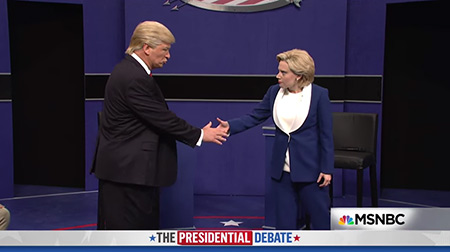|
Second presidential debate
Date:
Sun. Oct. 9,
2016 at Washington University in St. Louis, St. Louis, MO.
Time:
9:00-10:30 p.m. Eastern time without commercial
breaks.
Moderators:
Martha Raddatz, Chief Global
Affairs Correspondent, Co-Anchor of “This Week,” ABC
Anderson Cooper, Anchor,
CNN
Format:
The second presidential debate will take the form of a town meeting, in
which half of the questions will be posed directly by citizen
participants and the other half will be posed by the moderator based on
topics of broad public interest as reflected in social media and other
sources. The candidates will have two minutes to respond
and there will be an additional minute for the moderator to facilitate
further discussion. The town meeting participants will be uncommitted
voters selected by the Gallup Organization.
Source: CPD
Expectations
This debate was colored by the release two days earlier of a 2005
recording
of Trump making lewd remarks. The firestorm over those remarks
led to near universal condemnation of Trump; some Republicans withdrew
their
support, and there were calls for Trump
to drop out (+).
Clinton had a smaller challenge in the form of awkward questions
stemming from WikiLeaks' release on
Oct. 7 of a batch of
emails from Clinton campaign chairman John Podesta (+).
The town hall format could allow for more dynamic interactions by the
candidates than a traditional debate. Third party candidates were
again excluded.
No Clear Winner
The two candidates attacked each other to a
draw. Descriptions of the debate included such terms as "ugly"
(Politico) and "scorched earth" (CNN). In one exchange, which the
Trump campaign highlighted on its website
the next day, Clinton stated, "It's just awfully good that someone with
the temperament of Donald Trump is not in charge of the law in our
country." Trump responded, "Because you'd be in jail."
Trump's pre-debate press conference, described as a "stunt" and a
"spectacle" did not auger well for the evening. Then, at the
opening
of the debate, the candidates eschewed the handshake, instead standing
side by side and then heading to their respective stools.
One could argue that
Clinton won the debate by delivering more knowledgable and on point
responses, while Trump continued to show significant deficiencies in
his policy knowledge. Clinton delivered a solid enough
performance. Since she appears to be ahead in the polls, one
could argue that that amounted to a win.
The wounded Trump could claim a win for surviving to fight another
day. Given the
criticism Trump has endured in the past several days, it was something
of
an accomplishment for him to make it to the stage. Most observers
opined that he did better than in his first debate, but
that is not saying much. Trump was seen as speaking to his base,
and he may not have won over
many viewers.
For a town hall, this debate felt like it had a bit too much of the
moderators; perhaps more or all of the questions should asked by the
citizens in the hall.
In an Oct. 14 interview on "The Ellen Show" Clinton said of Trump, "You
could just sense how much anger he had, and so he was really trying to
dominate and literally stalk me around the stage, and I would just feel
this presence behind me."

NBC's "Saturday Night
Live" Oct. 16 opened with a
parody
of the debate featuring Alec Baldwin as Trump and Kate
McKinnon as
Clinton.
|
|
|


